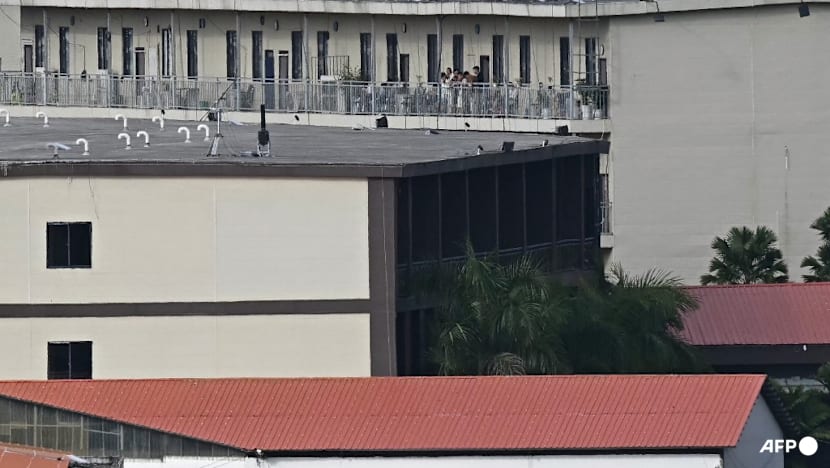SpaceX says it 'disabled' 2,500 Starlink devices at Myanmar scam centres
Many of the scam centres appeared to have installed large numbers of Starlink receivers on their roofs after Thailand cut their internet and power connections.

This photo, taken on Sep 17, 2025, shows people on a balcony of a building with what appears to be Starlink satellite dishes on the roof in the KK Park complex in Myanmar's eastern Myawaddy township, as pictured from Mae Sot district in Thailand's border province of Tak. (Photo: AFP/Lillian SUWANRUMPHA)
YANGON: SpaceX has cut service to more than 2,500 Starlink devices at scam centres in Myanmar, a company vice-president said on Wednesday (Oct 22), after AFP revealed that the use of the satellite internet terminals had exploded in the illicit industry.
Sprawling compounds where internet tricksters target foreigners with romance and business cons have thrived along Myanmar's loosely governed border during its civil war, sparked by a 2021 coup.
A highly publicised crackdown starting in February saw some 7,000 workers repatriated and Thailand enact a cross-border internet blockade.
But an AFP investigation this month revealed construction has continued apace.
Many of the centres appeared to have installed large numbers of Starlink internet receivers on their roofs after neighbouring Thailand cut their internet and power connections.
SpaceX's vice-president of Starlink business operations, Lauren Dreyer, said the company "disabled over 2,500 Starlink Kits in the vicinity of suspected 'scam centres'" in Myanmar.
Her post on X did not outline when the terminals were disconnected.
Myanmar's military announced this week it had raided KK Park - one of the country's most notorious scam centres - and seized 30 Starlink satellite internet terminals.
Those are only a tiny fraction of the number used at the site, according to AFP's investigation as well as independent analysis.
An AFP journalist on Wednesday saw more than 1,000 people travelling away from the site on foot, by motorbike and crammed into pickup trucks.
One departing KK Park worker told AFP the crackdown was ongoing.
"Around 10am, Myanmar military soldiers in four trucks arrived to our site," said one worker who declined to give his name for security reasons.
The scam centres have emerged as a key plank in the wartime economy of Myanmar, where the military has been fighting an array of rebel groups since seizing power.
Frustrated that Chinese citizens were ring-leading scams, being trafficked into the hubs and defrauded by them, Beijing in February led the pressure campaign to curb the booming black market.
The junta relies on military backing from China to maintain its grip on power.
But it also relies on powerful militias controlling the border regions on their behalf, in return for profiting from the scam centres, analysts said.
"They need to be able to enrich those militias," said Nathan Ruser, an analyst at the Australian Strategic Policy Institute. "But then they also have the pressure from China."
The result is a "balancing act", he said, with the junta "tokenistically" taking action "while actually not doing anything".














